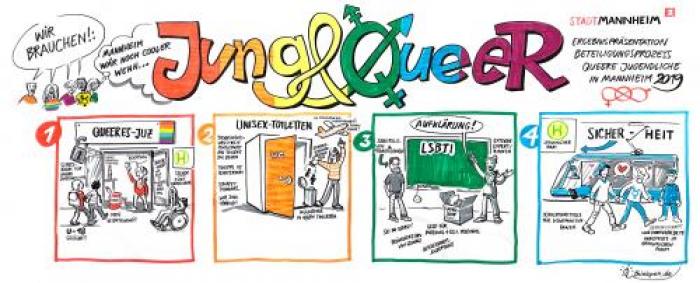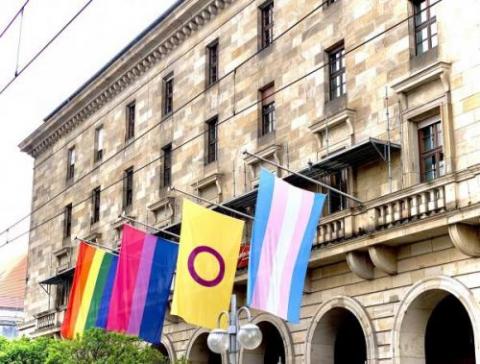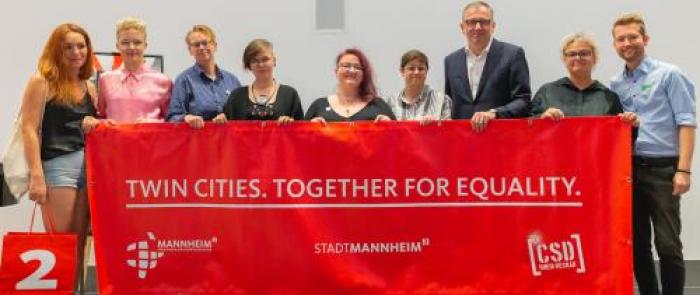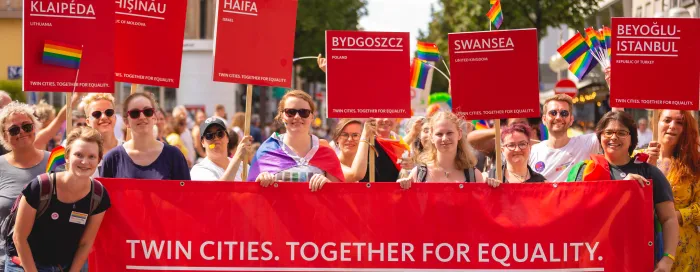This interview is part of our series “#ProgressiveLocalStories”, aiming at raising awareness on the many positive initiatives implemented by progressive cities and regions in Europe. Cities and regions have become laboratories for innovative solutions and, with this series, we want to discover how progressive mayors, councillors and presidents of regions put in place policies to promote and protect LGBTIQ rights.
Lord Mayor Kurz, your city, Mannheim, is a good model for the promotion and protection of LGBTIQ rights. As a progressive local politician, what do you think about the protection of LGBTIQ rights in your city and in Europe?
Equal opportunities and the participation of all people in our city, as well as respectful living together in diversity, are a core concern for Mannheim and part of our DNA as a city. LGBTIQ people are an enriching and natural part of Mannheim's diverse urban community. This is why the Mannheim 2030 mission statement sets out in clear terms: "In Mannheim 2030, no-one is insulted or discriminated against on the grounds of their [...] biological or social gender, [...] sexual or gender identity, gender features or various sexual characteristics [...] LGBTI people are a natural and valued part of urban society – from schools and working life to football clubs."
Like many of the great challenges of our time, such as climate change, international terrorism and the like, group-focused enmity will not be overcome without the involvement of local players. Social acceptance of diversity must be addressed at local level. This is why we have created the Mannheim Alliance for Living Together in Diversity, a platform for communication between the various target groups (such as women, LGBTIQ people, people with disabilities, people with migration or refugee backgrounds) and stakeholders (businesses, associations, educational and cultural establishments, churches and communities, and so on) in which reciprocal prejudices can be effectively dismantled and new partnerships can arise through collaboration between players who have not previously worked together. The common basis is the Mannheim Statement on Living Together in Diversity, in which sexual and gender identity are included as features worthy of personal protection. The Mannheim Alliance includes many queer associations and organisations, which can thus play a direct role in shaping its priorities.
What specific measures have you taken to make your city one in which the rights of LGBTIQ people are fully respected and furthered?
Mannheim has taken a series of tangible measures in this area. Among other things:
The establishment in 2015 of an office for equal opportunities for people of diverse sexual and gender identities was an important step towards greater visibility and structural integration of queer community issues into the work of the administration.
The Sexual and Gender Diversity Round Table provides a platform in Mannheim for regular expert discussions between the local queer community, the queer policy spokespeople of the political groups from the Mannheim Municipal Council and the administration. The decisions taken there help to raise awareness and understanding, including across political parties and social groups.
In 2015, Mannheim became a member of the Rainbow Cities Network. In this global network, cities from all over the world swap strategies to strengthen equal opportunities for people in the queer community. Since 2018, the City of Mannheim has been on the board of directors.
In 2019, the City of Mannheim was the first signatory to support the employers' #positivarbeiten declaration and in so doing, as the employer of more than 8 000 staff, sent a strong signal of acceptance of and solidarity with HIV-positive staff.
On the safety front, in 2019 Mannheim teamed up with the City of Heidelberg and PLUS (a lesbian and gay psychological counselling association) to launch the Safe Out? survey, which looked at both the personal experience of discrimination and the perception of safety in the queer community. Drawing on the results, a survey conducted on safety in 2020 for the first time included explicit questions about sexual and gender identity in order to develop specific building blocks for prevention.
In 2019, Young and Queer was the first urban participation scheme for young people that gathered, discussed and presented the interests, needs and demands of queer youngsters in a systematic way in the ambit of local politics. The four areas in which the greatest need for action was identified were "A young queer meeting point", "Safety in public places/local transport", "Unisex toilets" and "Education campaign in school/youth contexts". The first outcome has been discussion in the youth support committee on setting up a queer youth meeting point.

For a number of years now, awareness has been raised, in collaboration with the lesbian and gay parents' initiative (ILSE) and in connection with International Family Equality Day, of the issues concerning rainbow families.
For many years there has been support for institutions working in counselling queer young people and queer refugees, as well as counselling and prevention work on sexual health. Funding is also provided for running an education project in schools.
In 2018, the city set up a visibility network for queer women in Mannheim.

The European Commission proposed its first LGBTIQ strategy last year and the European Parliament recently declared the EU an LGBTIQ freedom zone. How can the European Union further contribute to promoting LGBTIQ equality and why is this important for your city?
Both the European Commission's LGBTIQ strategy and the European Parliament's commitment to the fundamental rights of LGTBIQ people are important and necessary measures that make it clear that the human rights of vulnerable groups in the EU are an inalienable core of our fundamental values. The European Convention on Human Rights is both a legal basis and a values basis.
An important tool in gauging the evolving situation are the regular studies of the European Fundamental Rights Agency (FRA). They also enable local differences across Member States to be clearly identified. However, since there are also very large differences within individual countries, it is important to focus even more on the local situation in the future. This will give visibility to the commitment of individual cities and regions against discrimination and in favour of equal opportunities.
Mannheim's international engagement rests on values-based collaboration. In 2020, for instance, it joined a Council of Europe initiative condemning the declaration by some cities and regions in Poland that they were "LGBT-free zones". In a letter sent to our Polish twin city, Bydgoszcz, I encouraged the city leaders in their diversity-friendly path and offered them support. Before that, queer human rights activists from Mannheim's twinned cities had been invited here for Pride Week as part of the "Twin Cities. Together for Equality" project in 2017 and 2018. In this way Mannheim supported the networking of activists from Poland, Lithuania, the United Kingdom, Israel, Moldova and Turkey.
In this connection, easily accessible support for such programmes by the European institutions would be welcome in order to enable even more civil society stakeholders to conduct exchanges and learn from one another.
However, for the city of Mannheim, the reasons for LGBTIQ equal opportunities and non-discrimination are more than just ethical ones. For an increasing number of young people, in particular, not only the stance taken by the future employer but also the openness of the potential future place of residence are things that matter. For example, LGBTIQ-friendliness has become a factor in choice of location that plays a role not only for LGBTIQ people themselves, but also as a litmus test for openness to diversity for many other talents, which is important for creativity and innovation and has an impact on the attractiveness of cities.

***
Photo credits:
Photo 1 and 3: Stadt Mannheim, Alexander Kästel
Photo 2: Stadt Mannheim, Sören Landmann
Photo of the graphic: Stadt Mannheim, Stefan Müller
Video credits: Stadt Mannheim, LSBTI-Beauftragung
